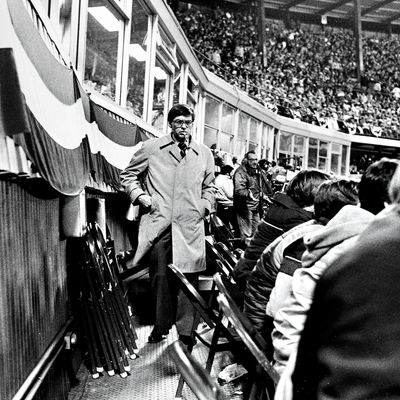
It’s been hard not to wonder, watching NFL commissioner Roger Goodell’s nightmare month, how in the world this dope was ever put in charge of anything. In his infamous disaster of a press conference addressing the league’s handling of Ray Rice, Goodell basically put on a clinic of how not to answer media questions, stumbling, shifting uncomfortably, providing one nonanswer after another until every phrase coming out of his mouth was a mishmash word soup like a paper your PR 101 T.A. would spend hours circling with a red pen. If a sports commissioner is supposed to be the law, the one serving as his sport’s ambassador, the human caretaker of a virtuous and eternal game, how could this man have gotten that job?
But that is not what a sports commissioner does, not anymore. There was a time when high-minded public stewardship was the main feature of the job description, a fan’s representative charged with the health of the sport. Back in the days of Peter Ueberroth and A. Bartlett Giamatti, the idea was that we wanted an intellectual, an academic even, to rise above the game, to make sure it was safe from the grubby mitts of human greed. (This is why Bob Costas’s name has been floated for 30 years for baseball commissioner, though I’ve always suspected it’s Bob who does the floating.) Even as the NFL and NBA commissioners worked on expanding their leagues, they were never thought of as management or labor: They were in large part considered benevolent guardians.
One man changed that: baseball’s Bud Selig. And how he found his way to the commissioner’s office is telling. Fay Vincent had taken over after his longtime friend Giamatti died of a heart attack, but he was quickly overrun by a group of aggressive owners wanting to take a harder line on player salaries. (Vincent had been spending too much time dealing with Pete Rose and Steve Howe and not maximizing baseball revenue.) Vincent quit after just three years in office, following a no-confidence vote from the owners, and he didn’t pretend not to know what it was about: “To do the job without angering an owner is impossible. I can’t make all 28 of my bosses happy. People have told me I’m the last commissioner.” He was. Because the owners simply replaced him with an owner.
Selig’s impending retirement this January will lead to countless elegies meant both to praise and bury him, but it’s undeniable that he changed the role of sports commissioners everywhere. Selig was not some independent arbiter in labor issues; he was as partisan toward the owners as possible because he was one of them. Donald Fehr, the players-union head who battled with Selig constantly over the years, actually appreciated this, explaining that, at last, when he talked to the commissioner, he knew there was no more false objectivity: The commissioner was the adversary. Selig changed the job from “caretaker of the game” to “guy in charge of making sure owners made as much money as humanly possible.” This was not just an oligarchy anymore: This was a commish-as-corporate-exec, answering not to the fans but to the board of directors made up exclusively of owners.
And it turns out, as bad as it might sound, that this is not a bad way to act as a commissioner — up to a point. For all the yearly “The sport is dying!” columns that baby-boomers write because they stopped emotionally maturing at 15, baseball’s revenues are skyrocketing and more people are watching baseball than at any time in human history. Money (turns out!) happens to be the lifeblood of the game: The influx of cash has led to labor peace, the only real existential threat baseball’s ever truly faced. Baseball is healthier than it was when Selig took over, by a long shot.
Of course, baseball has had one big problem in the Selig era: bad press. (Recounting all the stories here would just feel like piling on.) But in the eyes of Selig’s bosses, that’s a minor issue: As long as the revenue keeps increasing, everything’s cool. Which is why Goodell could have such a disastrous press conference — and such a tone-deaf, ham-fisted reaction to the Rice mess in the first place — and remain commissioner. His job is not to make football look good in the eyes of the public or to be some sort of public ambassador. His job is to make the mostly boys’ club of NFL owners preposterous amounts of money. And he is terrific at that. He has said his goal is to make the NFL a $25 billion-a-year business by 2027, and if the sport doesn’t burst into flames by then, he might just do it.
The problem with Goodell is that he has never been satisfied with just being a guy who makes money for his bosses (and himself — his pay was $44 million last year). He grew up revering football and really does see himself as a steward as well. Unfortunately, that’s the part he’s terrible at. In trying to keep the game as “pure” and family-friendly as it is in his imagination, he polices the game like a cop, when he’s not a cop: He’s just a middle manager. Compare this with new NBA commissioner Adam Silver, who won his big Donald Sterling press conference last April as definitively as Goodell lost his big press conference. Silver is a master of messaging already, and even though he had to know he didn’t have the legal standing to throw Sterling out of the league, he claimed he could in his press conference, which is precisely what everyone wanted — needed — to hear. He’s by far the most popular commissioner in sports.
But he’ll be judged on whether he keeps the NBA gravy train running. The NBA may be cooler and more progressive than the NFL or MLB, but it’s making a lot less money too. Eventually, Silver’s going to have to do something that doesn’t flatter him but does help rake in more cash for his 30 bosses. It’s inherent in the job description.
So maybe it’s time to think about changing the job description? Joe Sheehan, one of the founders of Baseball Prospectus and now the author of the Joe Sheehan Baseball Newsletter, posited recently that baseball should install a second leadership figure in a position he calls chief baseball officer. This person would be the public representative of the game, what we imagine a commissioner to be, alongside the actual commissioner, who would remain the money-printing officer he’s become in all major sports.
In baseball, this second person would deal with pace of game, with PEDs, with expansion, with discipline, with instant replay. In the NFL, it’d be rule changes, pass-interference calls, player safety. In the NBA, defensive rules, three-point-line distance, shot-clock changes, and so on. Ideally it would be someone younger, with a connection to the game but maybe not of the game — think Theo Epstein rather than Tony LaRussa, Cris Collinsworth rather than Tony Dungy, Stan Van Gundy rather than Pat Riley (so yes, Costas, you can apply). This person would be in charge of game play — the gentle tending of the game and its place in American life — solely. He would have nothing to do with the financials whatsoever. Think of it like the church-state separation that exists between the editorial and advertising departments of a newspaper. (Well, the church-state separation that used to exist, anyway.)
If Silver proves to have less business acumen than his old boss David Stern but can win press conference after press conference, make him chief basketball officer and put an old Goldman Sachs guy in the commissioner’s office. Whatever else this reform would accomplish, it’d be a way to never, ever, allow Roger Goodell behind a dais again.
*This article appears in the October 6, 2014 issue of New York Magazine.






























